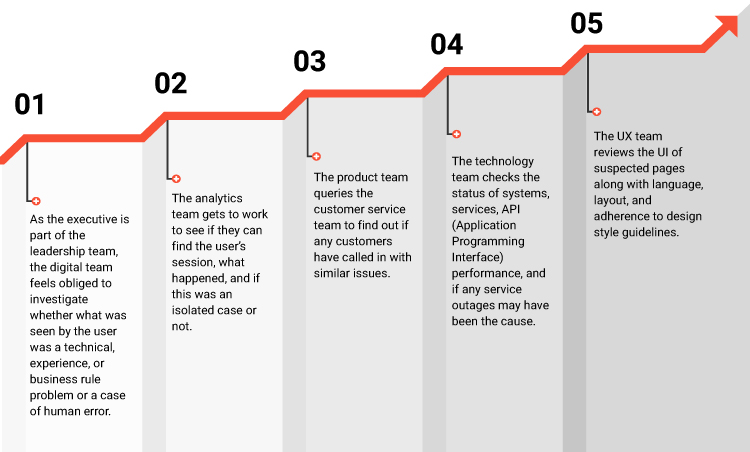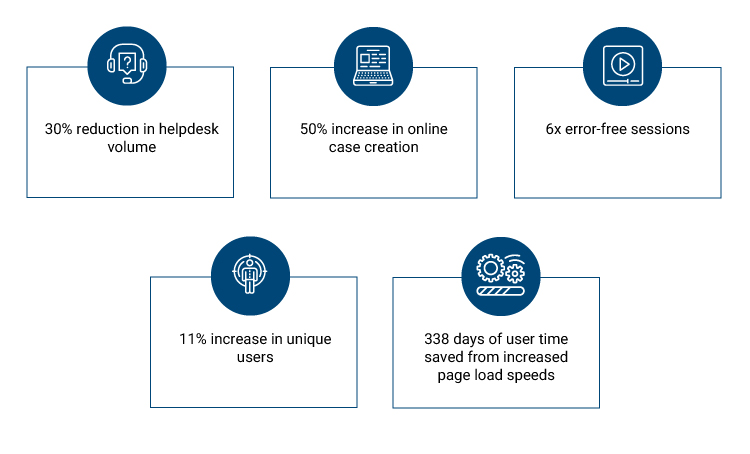

January 11, 2024 - by Brett Sharp
According to a survey by our partner Quantum Metric less than 25% of customer service escalations lead to an improvement in business performance, with the rest resulting in marginal improvements at best. This translates into the digital team spending TWO months a year on items that have a negligible impact on the business. TWO MONTHS!
Every company wants to keep their customers happy and engaged. Yet, customer experience continues to be a major challenge for most businesses. According to Forrester’s 2023 Customer Service Index, despite more than 80% of business leaders indicating that improving CX is a high priority, just 6% of brands saw a significant increase in 2023, compared to 10% the year prior.
Customer experience issues start innocently enough; an executive forwards an email to the digital team about how a user had difficulty using the company website.

Maybe they find something, but more than likely they don’t. If they do find something, what can they do about it? Is it something that can fixed by the latest release? Was the issue temporal and no longer happening? Or did it occur due to a specific set of circumstances? Is the fix simple or complex, is it a change to the UI, technology, or even the business rule?
Regardless of the issue (and the associated diagnosis), the product manager must decide how to respond to the executive and what they will do about it. This may seem like a small thing, but imagine if the escalations occur once a week, and it takes the team a day to diagnose the root cause, understand if it is something they can fix, implement a fix, and explain this back to the executive. This scenario is one of the biggest time wasters for digital teams and interrupts the priorities other teams have for the week.
Now, also imagine the same team is spending time working on other false positives reported from other sources, such as the call center, marketing, etc. And spending time trying to react to the issues that these other areas are reporting. This adds up to the digital team spending a lot of time every month stuck in a find-and-fix cycle with no real guarantee of return and not working on the major roadmap issues that will help improve product capabilities, the user experience, or business outcomes.
For most IT, CX, and product management teams, this is a grim reality! But what if you could turn this inefficiency around? A 25% improvement in mean time to resolution (MTTR) could save organizations up to $100K/month! And a 75% improvement mean time to resolution could save up to $1M/month!
What if someone could help you diagnose, scale, prioritize, and make recommendations on how to fix the issue and deploy it for you, freeing up your digital team to focus on the product roadmap and get those new capabilities and their associated business benefits to market faster?
Engaging with a skilled customer experience partner can help you exploit the capabilities of an ultramodern journey analytics platform, years of UX and UI design skills, and a deep technical bench to manage your experience optimization needs. Not only will it save your company money, but also allow you to drive your business forward and capture the market share it needs.
We call this XO (eXperience Optimization). It is the ongoing process of understanding what your customers need and providing the best possible experience for them across all touchpoints. It allows businesses to sustain customer experience levels despite the rapid expansion of devices and marketing channels, the evolution of customer expectations, and changes in business practices.
As organizations struggle to stand out in a competitive market, continuous experience optimization can truly make a difference. It can empower organizations to embrace a cultural shift and make incremental changes and improvements to the overall customer experience, which can eventually lead to significant results. At Macquarium, a Synoptek company, we have been helping organizations reimagine the customer experience. By establishing competencies and best practices for your CX program, we strengthen the very foundation of customer experience design, enabling improvements and innovation along the way.
Norfolk Southern Railways used our XO offering to greatly improve the experience of their customer portal. The company was able to understand, quantify, and prioritize the experience problems, bring elegant design solutions to those problems with the greatest returns, and help development focus on the items that matter most. Norfolk Southern saw reductions in inbound service calls, better adoption of new capabilities, and large improvements in time to resolution. It also allowed their teams to focus on their product roadmap and increased the speed of releasing new capabilities to the market.

We believe the XO is the service you never knew you needed. Reach out to us to learn more about how this service can benefit your company.
Original Article posted on Macquarium, Inc.
Brett Sharp is the Senior Director of Customer Experience at Synoptek, bringing over 22 years of relevant experience to the position. As a CX Strategy & Design executive, Sharp defines and scales the corporate vision, aligning strategy and managing execution in addition to enhancing the team's competency to deliver a consistent and elevated customer experience. Using an analytical, results-oriented approach, he helps develop successful programs which effectively reduce attrition, improve profitability, and serve as the foundation for sustained revenue growth.